2023届高考英语二轮复习:宾语从句(定义、分类、要点:时态、语序、引导词)课件(共20张PPT)
文档属性
| 名称 | 2023届高考英语二轮复习:宾语从句(定义、分类、要点:时态、语序、引导词)课件(共20张PPT) | 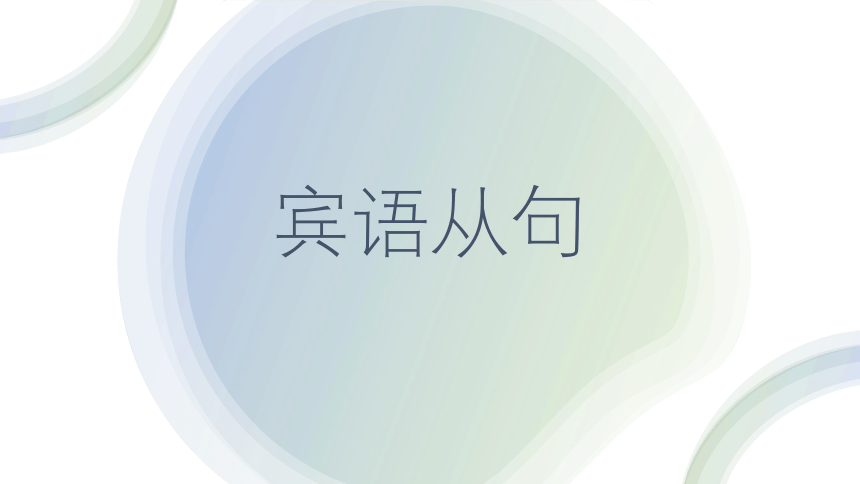 | |
| 格式 | pptx | ||
| 文件大小 | 291.5KB | ||
| 资源类型 | 教案 | ||
| 版本资源 | 通用版 | ||
| 科目 | 英语 | ||
| 更新时间 | 2023-02-11 14:10:43 | ||
图片预览

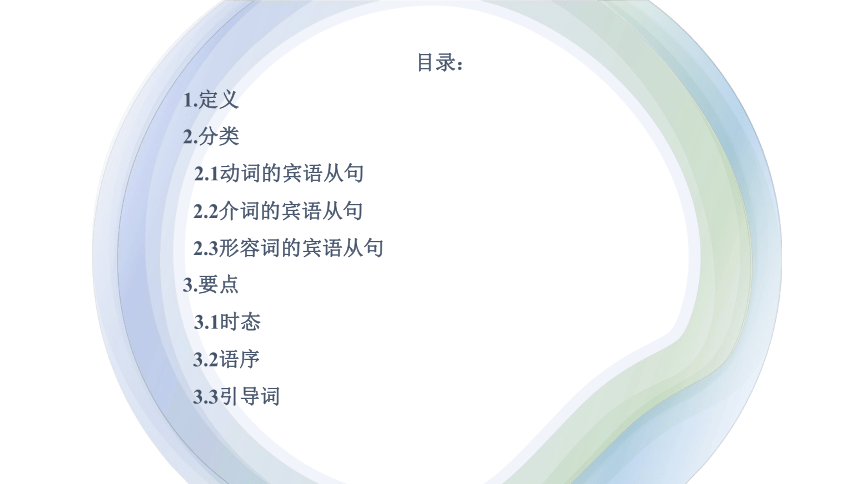
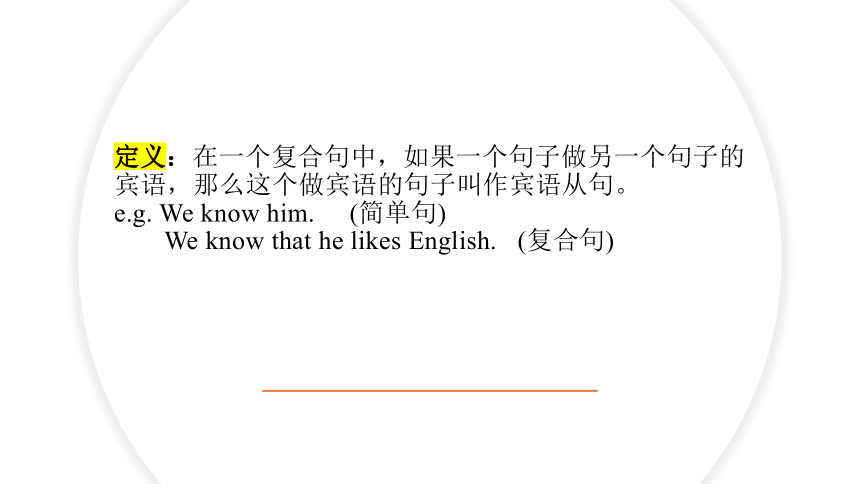
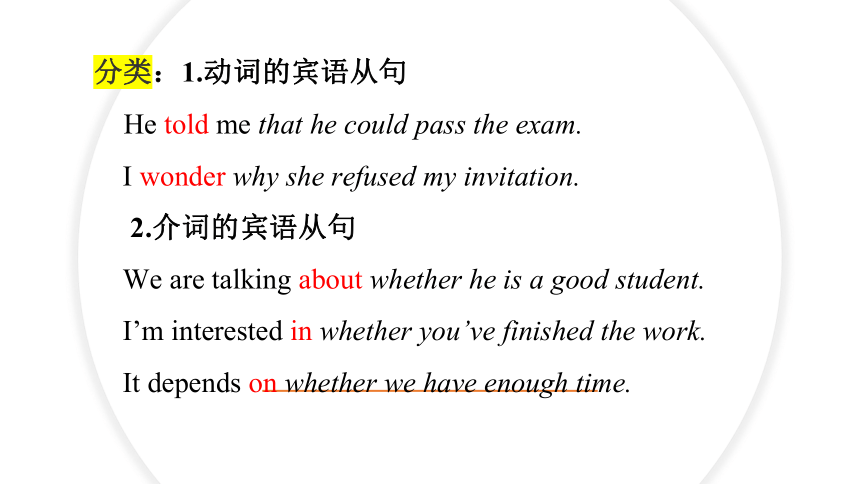
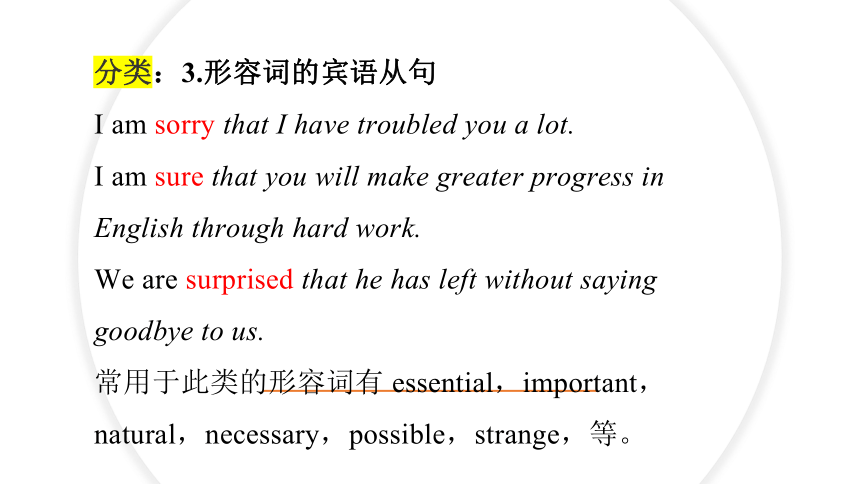
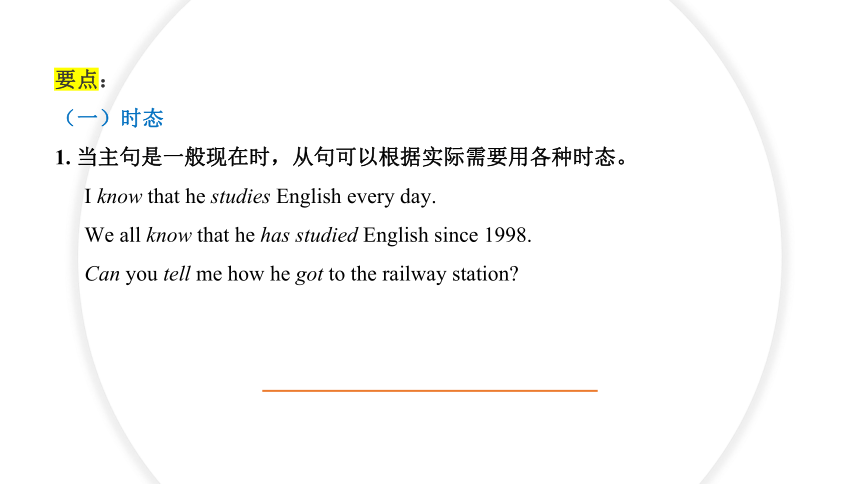
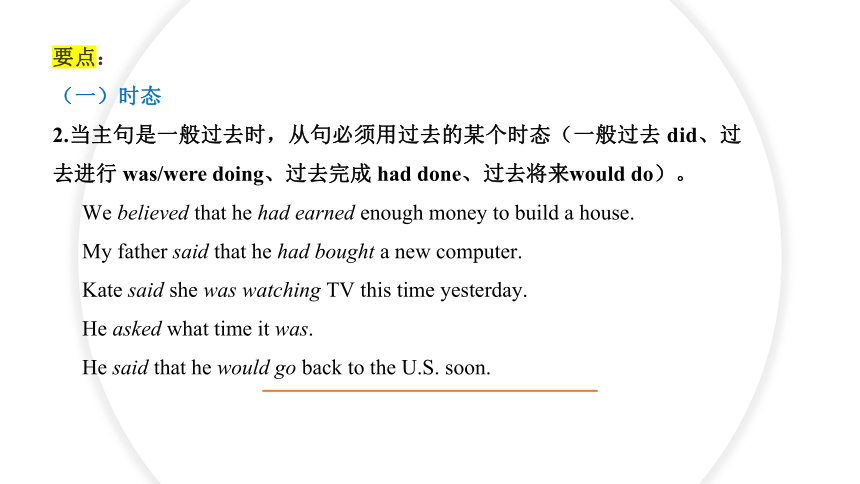

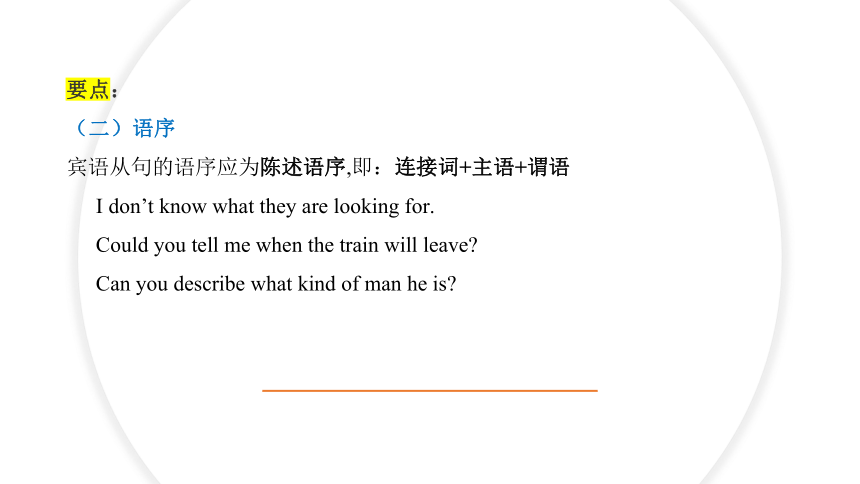
文档简介
(共20张PPT)
宾语从句
目录:
1.定义
2.分类
2.1动词的宾语从句
2.2介词的宾语从句
2.3形容词的宾语从句
3.要点
3.1时态
3.2语序
3.3引导词
定义:在一个复合句中,如果一个句子做另一个句子的宾语,那么这个做宾语的句子叫作宾语从句。
e.g. We know him. (简单句)
We know that he likes English. (复合句)
分类:1.动词的宾语从句
He told me that he could pass the exam.
I wonder why she refused my invitation.
2.介词的宾语从句
We are talking about whether he is a good student.
I’m interested in whether you’ve finished the work.
It depends on whether we have enough time.
分类:3.形容词的宾语从句
I am sorry that I have troubled you a lot.
I am sure that you will make greater progress in English through hard work.
We are surprised that he has left without saying goodbye to us.
常用于此类的形容词有 essential,important,natural,necessary,possible,strange,等。
要点:
(一)时态
1. 当主句是一般现在时,从句可以根据实际需要用各种时态。
I know that he studies English every day.
We all know that he has studied English since 1998.
Can you tell me how he got to the railway station
要点:
(一)时态
2.当主句是一般过去时,从句必须用过去的某个时态(一般过去 did、过去进行 was/were doing、过去完成 had done、过去将来would do)。
We believed that he had earned enough money to build a house.
My father said that he had bought a new computer.
Kate said she was watching TV this time yesterday.
He asked what time it was.
He said that he would go back to the U.S. soon.
要点:
(一)时态
3.当从句的内容为客观真理、名言谚语时,不受主句时态限制,均用一般现在时。
The teacher told us that the sun rises in the east.
Miss Hu said that the earth goes around the sun.
Our teacher said that January is the first month of the year.
要点:
(二)语序
宾语从句的语序应为陈述语序,即:连接词+主语+谓语
I don’t know what they are looking for.
Could you tell me when the train will leave
Can you describe what kind of man he is
要点:
思考:如何变陈述句语序?
(1)如果一个疑问句中含有be动词,情态动词等时,只需将be动词,情态动词等还原到主语之后。
Where are you from I wonder where you are from.
Can he play basketball I wonder whether/if he can play basketball.
要点:
思考:如何变陈述句语序?
(2)如果一个疑问句中含有助动词do的各种形式时,需将助动词do的各种形式删除,再将宾语从句动词变为对应的时态。
Where does he live I wonder where he lives.
要点:
(三)引导词:
由that引导的宾语从句:
要点:(一)that引导宾语从句:①不作成分,只起连接作用;②没有意义,通常可以省略。
He has told me (that) he will go to Shanghai tomorrow.
I think (that) he is an honest man.
要点:
(三)引导词:
由that引导的宾语从句:
要点:(二)可以跟that 从句做宾语的动词有:
say, think, insist, wish, hope, demand, imagine, wonder, know, suppose, see, believe, agree, admit, deny, expect, explain, order, command, feel, dream, suggest, hear, mean, notice, prefer, request, require, propose, declare, report等,这些动词后的宾语从句中的连接词that通常都可以省略。
要点:
(三)引导词:
由that引导的宾语从句:
注意:在以下几种情况中that不能省略:
从句前有插入语时,that不可省略。
We hope, on the contrary, that he will stay at home with us.
2)一个句子有两个或多个并列宾语从句时,引导第二个及以后的宾语从句中的that不能省略。
He said (that)he was wrong and that he would say sorry to me.
要点:
(三)引导词:
由that引导的宾语从句:
注意:在以下几种情况中that不能省略:
3)that作介词宾语时,that不可省略。
The reason lies in that she works harder than the others.
4)由it作形式宾语时,that引导的宾语从句中,that不可省略。
I think it impossible that he can finish the task in such a short time.=
I think that he can finish the task in such a short time impossible.
要点:
(三)引导词:
II. 由whether / if引导的宾语从句:
要点:(一)whether / if引导宾语从句:①具有一定意义,意为“是否” ②不作成分,不可省略。
He wonders whether I will go to party this weekend.
I want to know if /whether he lives there.
He asked me whether/if I could help him.
Mike wonders whether/if it will rain tomorrow.
要点:
(三)引导词:
II. 由whether / if引导的宾语从句:
注意:whether和if的使用区别:
whether能与or not直接连用,if则不能。
I wonder whether/if it’s going to rain or not .
I wonder whether or not it’s going to rain .
当or not出现在句尾的时候,whether和if可以互换;但当or not出现在宾语从句的开头,只能用whether.
要点:
(三)引导词:
II. 由whether / if引导的宾语从句:
注意:whether和if的使用区别:
whether能放在介词后,if则不能。
Everything depends on whether we have enough money.
whether后能接to do不定式,if则不能。
He asks me whether to see a film.
当if引起歧义时,不要用if。
Please let me know whether you are busy.
要点:
(三)引导词:
III. 由连接代词、连接副词和wh-ever引导的宾语从句:
要点:who, whom, whose, which, what, whoever, whatever, whichever, when, where, why, how引导宾语从句:
①担任句子成分,包含一定意义;②起连接作用,不可省略。
I want to know what he has told you.
He wonders where you live.
要点:
否定转移:否定的信息焦点在从句里,否定的形式却在主句里。
I think that he will become the new leader.
I don’t think that he will become the new leader.
宾语从句
目录:
1.定义
2.分类
2.1动词的宾语从句
2.2介词的宾语从句
2.3形容词的宾语从句
3.要点
3.1时态
3.2语序
3.3引导词
定义:在一个复合句中,如果一个句子做另一个句子的宾语,那么这个做宾语的句子叫作宾语从句。
e.g. We know him. (简单句)
We know that he likes English. (复合句)
分类:1.动词的宾语从句
He told me that he could pass the exam.
I wonder why she refused my invitation.
2.介词的宾语从句
We are talking about whether he is a good student.
I’m interested in whether you’ve finished the work.
It depends on whether we have enough time.
分类:3.形容词的宾语从句
I am sorry that I have troubled you a lot.
I am sure that you will make greater progress in English through hard work.
We are surprised that he has left without saying goodbye to us.
常用于此类的形容词有 essential,important,natural,necessary,possible,strange,等。
要点:
(一)时态
1. 当主句是一般现在时,从句可以根据实际需要用各种时态。
I know that he studies English every day.
We all know that he has studied English since 1998.
Can you tell me how he got to the railway station
要点:
(一)时态
2.当主句是一般过去时,从句必须用过去的某个时态(一般过去 did、过去进行 was/were doing、过去完成 had done、过去将来would do)。
We believed that he had earned enough money to build a house.
My father said that he had bought a new computer.
Kate said she was watching TV this time yesterday.
He asked what time it was.
He said that he would go back to the U.S. soon.
要点:
(一)时态
3.当从句的内容为客观真理、名言谚语时,不受主句时态限制,均用一般现在时。
The teacher told us that the sun rises in the east.
Miss Hu said that the earth goes around the sun.
Our teacher said that January is the first month of the year.
要点:
(二)语序
宾语从句的语序应为陈述语序,即:连接词+主语+谓语
I don’t know what they are looking for.
Could you tell me when the train will leave
Can you describe what kind of man he is
要点:
思考:如何变陈述句语序?
(1)如果一个疑问句中含有be动词,情态动词等时,只需将be动词,情态动词等还原到主语之后。
Where are you from I wonder where you are from.
Can he play basketball I wonder whether/if he can play basketball.
要点:
思考:如何变陈述句语序?
(2)如果一个疑问句中含有助动词do的各种形式时,需将助动词do的各种形式删除,再将宾语从句动词变为对应的时态。
Where does he live I wonder where he lives.
要点:
(三)引导词:
由that引导的宾语从句:
要点:(一)that引导宾语从句:①不作成分,只起连接作用;②没有意义,通常可以省略。
He has told me (that) he will go to Shanghai tomorrow.
I think (that) he is an honest man.
要点:
(三)引导词:
由that引导的宾语从句:
要点:(二)可以跟that 从句做宾语的动词有:
say, think, insist, wish, hope, demand, imagine, wonder, know, suppose, see, believe, agree, admit, deny, expect, explain, order, command, feel, dream, suggest, hear, mean, notice, prefer, request, require, propose, declare, report等,这些动词后的宾语从句中的连接词that通常都可以省略。
要点:
(三)引导词:
由that引导的宾语从句:
注意:在以下几种情况中that不能省略:
从句前有插入语时,that不可省略。
We hope, on the contrary, that he will stay at home with us.
2)一个句子有两个或多个并列宾语从句时,引导第二个及以后的宾语从句中的that不能省略。
He said (that)he was wrong and that he would say sorry to me.
要点:
(三)引导词:
由that引导的宾语从句:
注意:在以下几种情况中that不能省略:
3)that作介词宾语时,that不可省略。
The reason lies in that she works harder than the others.
4)由it作形式宾语时,that引导的宾语从句中,that不可省略。
I think it impossible that he can finish the task in such a short time.=
I think that he can finish the task in such a short time impossible.
要点:
(三)引导词:
II. 由whether / if引导的宾语从句:
要点:(一)whether / if引导宾语从句:①具有一定意义,意为“是否” ②不作成分,不可省略。
He wonders whether I will go to party this weekend.
I want to know if /whether he lives there.
He asked me whether/if I could help him.
Mike wonders whether/if it will rain tomorrow.
要点:
(三)引导词:
II. 由whether / if引导的宾语从句:
注意:whether和if的使用区别:
whether能与or not直接连用,if则不能。
I wonder whether/if it’s going to rain or not .
I wonder whether or not it’s going to rain .
当or not出现在句尾的时候,whether和if可以互换;但当or not出现在宾语从句的开头,只能用whether.
要点:
(三)引导词:
II. 由whether / if引导的宾语从句:
注意:whether和if的使用区别:
whether能放在介词后,if则不能。
Everything depends on whether we have enough money.
whether后能接to do不定式,if则不能。
He asks me whether to see a film.
当if引起歧义时,不要用if。
Please let me know whether you are busy.
要点:
(三)引导词:
III. 由连接代词、连接副词和wh-ever引导的宾语从句:
要点:who, whom, whose, which, what, whoever, whatever, whichever, when, where, why, how引导宾语从句:
①担任句子成分,包含一定意义;②起连接作用,不可省略。
I want to know what he has told you.
He wonders where you live.
要点:
否定转移:否定的信息焦点在从句里,否定的形式却在主句里。
I think that he will become the new leader.
I don’t think that he will become the new leader.
